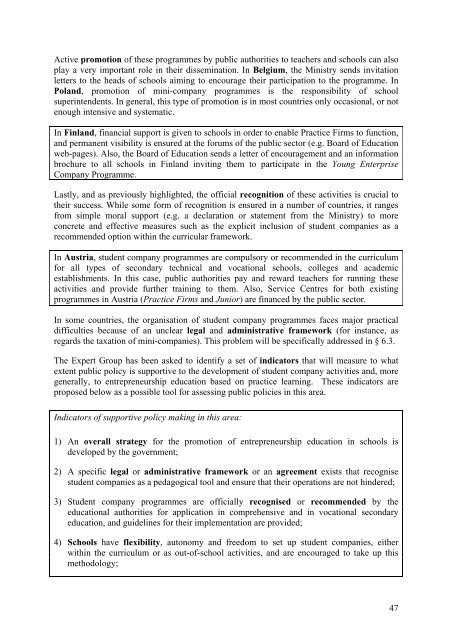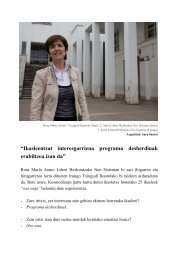Final Report of the Expert Group - European Commission - Europa
Final Report of the Expert Group - European Commission - Europa
Final Report of the Expert Group - European Commission - Europa
Create successful ePaper yourself
Turn your PDF publications into a flip-book with our unique Google optimized e-Paper software.
Active promotion <strong>of</strong> <strong>the</strong>se programmes by public authorities to teachers and schools can alsoplay a very important role in <strong>the</strong>ir dissemination. In Belgium, <strong>the</strong> Ministry sends invitationletters to <strong>the</strong> heads <strong>of</strong> schools aiming to encourage <strong>the</strong>ir participation to <strong>the</strong> programme. InPoland, promotion <strong>of</strong> mini-company programmes is <strong>the</strong> responsibility <strong>of</strong> schoolsuperintendents. In general, this type <strong>of</strong> promotion is in most countries only occasional, or notenough intensive and systematic.In Finland, financial support is given to schools in order to enable Practice Firms to function,and permanent visibility is ensured at <strong>the</strong> forums <strong>of</strong> <strong>the</strong> public sector (e.g. Board <strong>of</strong> Educationweb-pages). Also, <strong>the</strong> Board <strong>of</strong> Education sends a letter <strong>of</strong> encouragement and an informationbrochure to all schools in Finland inviting <strong>the</strong>m to participate in <strong>the</strong> Young EnterpriseCompany Programme.Lastly, and as previously highlighted, <strong>the</strong> <strong>of</strong>ficial recognition <strong>of</strong> <strong>the</strong>se activities is crucial to<strong>the</strong>ir success. While some form <strong>of</strong> recognition is ensured in a number <strong>of</strong> countries, it rangesfrom simple moral support (e.g. a declaration or statement from <strong>the</strong> Ministry) to moreconcrete and effective measures such as <strong>the</strong> explicit inclusion <strong>of</strong> student companies as arecommended option within <strong>the</strong> curricular framework.In Austria, student company programmes are compulsory or recommended in <strong>the</strong> curriculumfor all types <strong>of</strong> secondary technical and vocational schools, colleges and academicestablishments. In this case, public authorities pay and reward teachers for running <strong>the</strong>seactivities and provide fur<strong>the</strong>r training to <strong>the</strong>m. Also, Service Centres for both existingprogrammes in Austria (Practice Firms and Junior) are financed by <strong>the</strong> public sector.In some countries, <strong>the</strong> organisation <strong>of</strong> student company programmes faces major practicaldifficulties because <strong>of</strong> an unclear legal and administrative framework (for instance, asregards <strong>the</strong> taxation <strong>of</strong> mini-companies). This problem will be specifically addressed in § 6.3.The <strong>Expert</strong> <strong>Group</strong> has been asked to identify a set <strong>of</strong> indicators that will measure to whatextent public policy is supportive to <strong>the</strong> development <strong>of</strong> student company activities and, moregenerally, to entrepreneurship education based on practice learning. These indicators areproposed below as a possible tool for assessing public policies in this area.Indicators <strong>of</strong> supportive policy making in this area:1) An overall strategy for <strong>the</strong> promotion <strong>of</strong> entrepreneurship education in schools isdeveloped by <strong>the</strong> government;2) A specific legal or administrative framework or an agreement exists that recognisestudent companies as a pedagogical tool and ensure that <strong>the</strong>ir operations are not hindered;3) Student company programmes are <strong>of</strong>ficially recognised or recommended by <strong>the</strong>educational authorities for application in comprehensive and in vocational secondaryeducation, and guidelines for <strong>the</strong>ir implementation are provided;4) Schools have flexibility, autonomy and freedom to set up student companies, ei<strong>the</strong>rwithin <strong>the</strong> curriculum or as out-<strong>of</strong>-school activities, and are encouraged to take up thismethodology;47




